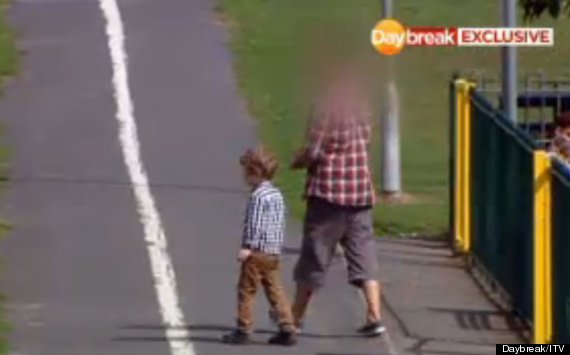- Investigation showed fake ‘predator’ approaching children in the park while their mothers – who had agreed to take part – were distracted
- Seven out of nine agreed to go with him thanks to his friendly manner
- Parents are urged to remind children that all strangers could pose a threat
Most parents go to great lengths to ensure that their children exercise caution when approached by strangers.
But a new investigation has revealed that their efforts may be in vain – as the majority of children are happy to be led away from their parents by someone they do not know.
Parents are now being urged to remind their children that predators are not always ‘spooky cartoon characters’, but often act in a friendly manner to try and win their victims’ trust.

Chilling: A Daybreak investigation has revealed that many children are happy to walk off with strangers; the man wearing a checked shirt posed as a potential predator for the experiment

Persuasive: The man asked children aged between five and 11 to help him look for a dog or another child
The chilling findings came in an experiment which was set up by Daybreak in association with children’s charity Kidscape.
A number of mothers who had previously agreed to participate took their children to a playground which had been closed off to the public.
When they were there, the mothers received a phone call from producers and walked off, leaving the children to play on their own.
They were then approached by a security guard who asked the youngsters, aged between five and 11, to help him look for his own child or a lost dog.
Out of nine children whom the man talked to – none of whom had ever seen him before – seven agreed to walk away from the playground with him.
The man needed just 90 seconds on average to convince the children to go with him, even though all had been warned about ‘stranger danger’.
Most of the children were younger than 10 and would not normally be allowed out of the house on their own, but one 11-year-old walked off with the man before realising her mistake and returning to her mother.
One of the children, a seven-year-old boy, initially refused to go with the man – but he changed his mind within 45 seconds.
‘It was extremely hard for me to do it,’ said Kerry, one of the mothers involved in the experiment who saw her son go willingly with the apparent predator.
‘He went so far, so quickly, I called him back – I actually couldn’t do it any more. I never thought he would go willingly with someone without physical contact.’

Sarah, whose 11-year-old daughter Paige agreed to help the man, said she was concerned about her daughter’s safety as she starts secondary school.
‘It really shocked me that she initially went with him,’ she told The Sun. ‘At 11, she is quite savvy but is also at the age where she thinks she knows it all.
‘But if it had happened on a busy street, she could have been in the back of the stranger’s car in that time.’
Another mother added: ‘If the adult that’s with them is distracted, it so easily could happen that they’d walk off with them.
‘I don’t think there’s enough education out there for young children. They need to be more aware of different situations that they could come across.’
Parents are encouraged to remind their children that even if strangers act in a friendly manner they should not be trusted.
‘It’s not good enough to say strangers aren’t people you can trust,’ said Daisy McAndrew, one of the journalists involved in the investigation. ‘They don’t necessarily look like spooky cartoon characters.’
Kidscape said in a statement: ‘Daybreak’s investigation has highlighted the potential consequences of our children not being taught appropriate ways of keeping safe in situations involving strangers.
‘Many important messages and skills need to be taught and practised from toddler years to teens. We have a duty to send our children safely into the world. The findings from this investigation help us to meet this important challenge.’
In the last year that records are available, 273 children were abducted by someone they did not know.
The children and parents who took part in the Daybreak experiment underwent psychological checks, and all the staff on site – including the ‘predator’ – had passed CRB checks.
None of the children knew they were being filmed at the time.


Leave a reply